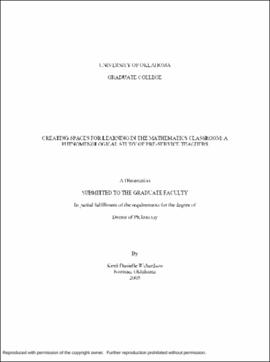| dc.contributor.advisor | Fleener, M. Jayne, | en_US |
| dc.contributor.advisor | Houser, Neil O., | en_US |
| dc.contributor.author | Richardson, Kerri Danielle. | en_US |
| dc.date.accessioned | 2013-08-16T12:19:54Z | |
| dc.date.available | 2013-08-16T12:19:54Z | |
| dc.date.issued | 2005 | en_US |
| dc.identifier.uri | https://hdl.handle.net/11244/909 | |
| dc.description.abstract | The Pirie-Kieren model for the dynamical growth of mathematical understanding and Brent Davis' mathematical mentalities were used as inquiry guides for this study. The work of Pirie and Kieren offered a way to engage students in their thinking about their experiences with mathematics, while Davis' mentalities helped frame questions to explore students' phenomenological experiences of being with mathematics. | en_US |
| dc.description.abstract | Themes were selected as part of an emergence of student relationships during the course of the semester. Each theme was reflective of a relationship which seemed to have the most prevalence among student experiences. Themes emerged from data sources such as conversations, interviews, field notes, assignments, and classroom observations made by the researcher. | en_US |
| dc.description.abstract | The findings indicate that meaningful experiences are important to students' ways of being in the world with mathematics. These experiences are discussed through emerging relationships such as folding back (Pirie & Kieren, 1994), language, relevance, and open-endedness. Other findings indicate ways to combine both theory and practice so that classroom teachers and mathematics educators may find value in the phenomenon of being in the world with mathematics. | en_US |
| dc.description.abstract | This is a phenomenological study of the types of relationships which emerged with a group of elementary education majors. The phenomenon studied was "being in the world with mathematics" and the atmosphere in which the phenomenon was studied was that of a problem-centered learning environment containing pre-service teachers. Students in the environment were accustomed to conversation, exploration, and collaboration. The instructor of the course promoted a dynamic environment which enabled students to experience mathematics education from a variety of perspectives. | en_US |
| dc.description.abstract | Implications for mathematics education may best be discussed in terms of curriculum. These findings call for a different perspective to be taken concerning the mathematics curriculum of schools and universities. This perspective involves viewing mathematics as a space for Richness, Recursion, Relations, and Rigor (Doll, 1993) to occur. It is hoped that this study will enrich the mathematical conversations of a variety of individuals ranging from seasoned practitioners and theorists to first year teachers. | en_US |
| dc.format.extent | ix, 127 leaves : | en_US |
| dc.subject | Mathematics Study and teaching (Elementary) | en_US |
| dc.subject | Education, Mathematics. | en_US |
| dc.subject | Education, Teacher Training. | en_US |
| dc.subject | Student teachers. | en_US |
| dc.title | Creating spaces for learning in the mathematics classroom: A phenomenological study of pre-service teachers. | en_US |
| dc.type | Thesis | en_US |
| dc.thesis.degree | Ph.D. | en_US |
| dc.thesis.degreeDiscipline | Department of Instructional Leadership and Academic Curriculum | en_US |
| dc.note | Source: Dissertation Abstracts International, Volume: 66-06, Section: A, page: 2145. | en_US |
| dc.note | Advisers: M. Jayne Fleener; Neil O. Houser. | en_US |
| ou.identifier | (UMI)AAI3179076 | en_US |
| ou.group | Jeannine Rainbolt College of Education::Department of Instructional Leadership and Academic Curriculum | |
